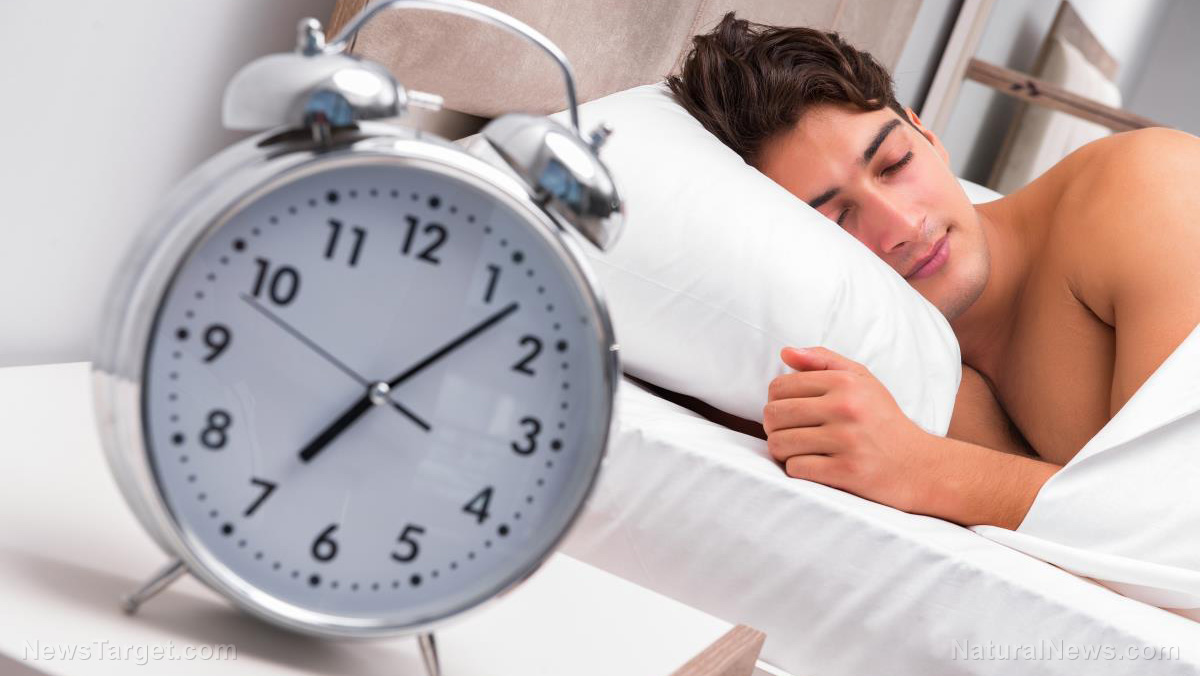Why eight hours of sleep doesn’t guarantee rest
11/01/2025 / By Jacob Thomas

- Sleep quality is more critical than quantity. Simply spending seven to nine hours in bed does not guarantee restful sleep; factors like sleep fragmentation and insufficient deep or REM sleep can leave you feeling tired.
- Your body’s internal clock, regulated by light and darkness, is essential for restorative sleep. Sleeping at the wrong biological time can cause fatigue, even after a full night.
- Persistent fatigue may signal underlying problems, such as a sleep disorder, metabolic strain, or other physiological imbalances that require medical evaluation.
- Experts recommend a multi-pronged approach, including morning light exposure, a consistent wake time, an evening wind-down routine and avoiding caffeine and late meals.
- Daytime fatigue should be seen as important information from your body, prompting you to investigate and address the root causes to prevent larger health issues.
For years, Patty Schmidt thought she was doing everything right. She adhered to a strict 10 p.m. to 6 a.m. schedule, avoided caffeine after lunch and stayed off screens before bed. Yet, she always woke up feeling exhausted.
“I thought I was disciplined about sleep, but my body told a different story,” said Schmidt. “I would wake up groggy, push through the day and crash again by midafternoon.”
Schmidt’s experience is a common frustration for millions. New research and expert analysis reveal that the sacred seven-to-nine-hour sleep rule is only part of the story. The true keys to waking up refreshed lie not in the quantity of sleep, but in its quality, timing and the complex internal processes it governs.
The quality vs. quantity conundrum
The long-held assumption that more time in bed equals more rest is being overturned. The real culprit for daytime fatigue is often sleep disruption, not a simple lack of hours.
“Quality is more important than quantity,” Daniella Marchetti, a clinical psychologist and board-certified behavioral sleep medicine specialist, said. “Sleep may not feel restorative if you are not getting enough deep sleep or REM or if your sleep is fragmented. Sometimes you remember waking up. Other times, there are micro-arousals between cycles that you do not recall. Those can be just as disruptive.”
This disconnect has tangible health consequences. A meta-analysis linked poor sleep quality, even with normal duration, to higher rates of anxiety, depression and cognitive decline.
Timing is everything. Sleeping at the wrong biological time, a state known as circadian misalignment, can render even a full night’s sleep ineffective. Our circadian rhythm governs hormone release, alertness and body temperature and when it falls out of sync with our daily schedule, fatigue follows.
According to BrightU.AI‘s Enoch, circadian rhythms are your body’s internal 24-hour clock, primarily influenced by light and darkness, which regulates cycles of sleepiness and alertness. It’s why you feel energized or tired at roughly the same times each day.
“If a person notices a pattern of significantly delayed sleep and wake times, they might have delayed sleep wake phase disorder,” noted Alexandra Wharton, a patient representative on the American Academy of Sleep Medicine’s Patient Advocacy Roundtable.
Dr. Clay Lowder, a family physician, emphasizes foundational cues for resetting this clock.
“We need to go back to that. Put down your screens and get to just walking or lifting weights. Sleep starts with good exercise during the day. You can’t wear your mind out all day and not wear your body out.”
When fatigue signals something deeper
Sometimes, unrefreshing sleep is a symptom of a more significant health issue. Research suggests that long sleep paired with fatigue may be a warning sign. A meta-analysis found a higher dementia risk among people who reported long but unrefreshing sleep, hinting at deeper metabolic strain.
Other hidden issues can sabotage rest. Frequent nighttime urination is linked to fragmented sleep and higher long-term mortality. Even treated sleep apnea may not resolve daytime fatigue if deeper physiological imbalances persist.
“Sleepiness is a symptom, not a character flaw,” Marchetti said. “Treat it like feedback. That approach can prevent larger health issues later.”
For those struggling, experts recommend a multi-pronged approach. Anchor your circadian rhythm with morning light exposure and a consistent wake time, even on weekends. Build an evening wind-down routine, cutting off caffeine by midday and finishing meals at least two hours before bed.
If fatigue lingers despite good habits, seek professional evaluation. As Schmidt discovered, the solution often lies beyond simply spending more time in bed. After adjusting her routine to include morning light and a consistent schedule, she saw a dramatic change.
“The difference was almost immediate,” she said. “I finally woke up without needing three cups of coffee to feel human. For the first time in years, I realized better sleep was possible.”
Watch this video to learn how you can heal while you sleep.
This video is from the BrightU Series Snippets channel on Brighteon.com.
Sources include:
Submit a correction >>
Tagged Under:
circadian misalignment, circadian rhythm, deep sleep, fatigue, health, REM Sleep, research, sleep disorders, sleep disruption, sleep hygiene, sleep improvement, sleep problems, sleep quality, sleep quantity, sleep routine, sleep schedule, sleep science, sleep tips
This article may contain statements that reflect the opinion of the author
RECENT NEWS & ARTICLES
Natural.News is a fact-based public education website published by Natural News Features, LLC.
All content copyright © 2018 by Natural News Features, LLC.
Contact Us with Tips or Corrections
All trademarks, registered trademarks and servicemarks mentioned on this site are the property of their respective owners.



















